Text

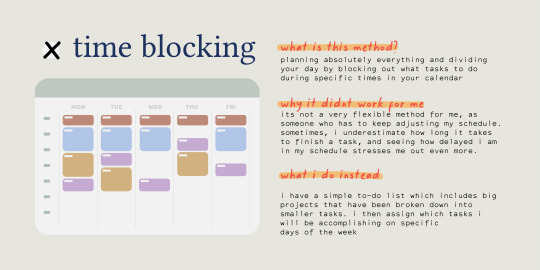
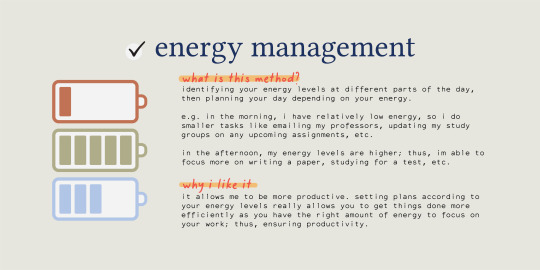
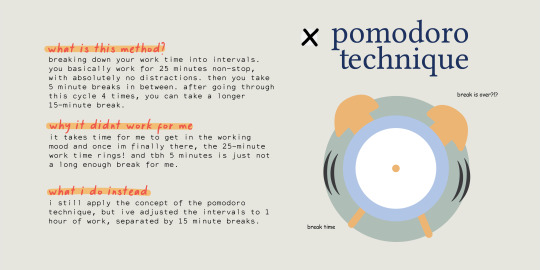
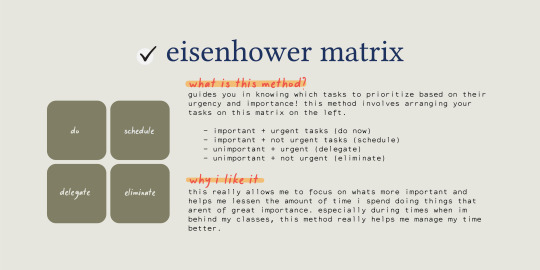
managing your time is something v v important! especially now that we're all at home, it's really easy for us (or for me, at least) to lose track of time. with this, here are some of the time management techniques i've tried including what worked and what didn't!
i very vaguely explained each time management technique, so here are some additional links you can check out if you wanted to know more about them:
time blocking
time blocking method by werelivingarts
flexible time blocking by eintsein
calendar blocking // time management for students by mariana's corner
getting more done with calendar blocking by amy landino
energy management
energy management by @eintsein
the one productivity system you need: time vs energy management by rowena tsai
5 tips to manage energy for higher productivity by mariana's corner
pomodoro technique
pomodoro technique 101 by werelivingarts
the pomodoro technique by mariana's corner
eisenhower matrix
time management for college students and the eisenhower matrix by mariana's corner
how to be more productive by using the eisenhower box by james clear
4K notes
·
View notes
Photo

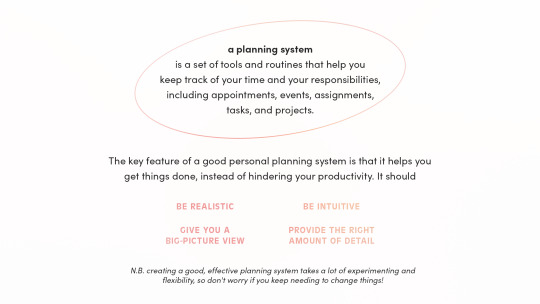

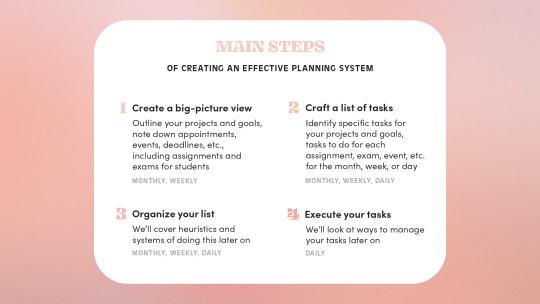
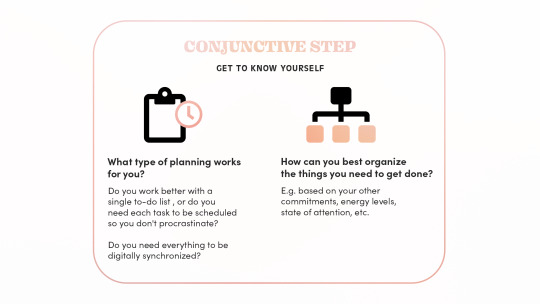



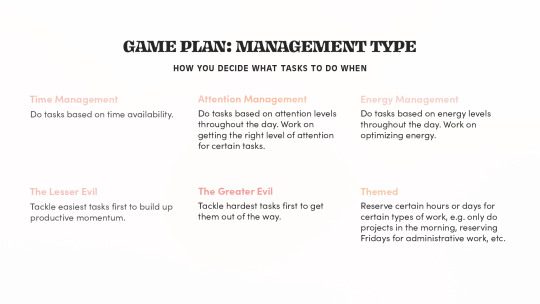

A Guide to Planning Systems
It’s important to have a system of getting things done, whether it’s tackling tasks as the day progresses or having a carefully planned schedule for every single hour of the week. How can you create an effective personal planning system that suits your needs and preferences?
Mentioned in this post:
Attention Management: How to Take Control and Live Intentionally
Energy Management: A Human-Based Organization Method
Flexible Time-Blocking: A More Breathable Way to Get Things Done
The ABCDE Method: Accomplish Tasks More Efficiently
My other posts
N.B. some categories include a few examples but they are no means limited to the ones listed here, e.g. there may be methods of organizing tasks other than the five listed here.
8K notes
·
View notes
Text
small things we should appreciate more
the chirping of birds in the early morning
the way the sun shines through the trees
nature after it just rained
constantly learning new things every day
libraries, bookshops, bakeries and coffeeshops
42K notes
·
View notes
Text
math help bc i can’t watch ya’ll suffer anymore
I’m in my fourth year of engineering school and I didn’t get here without lots of outside help bc assigned math textbooks are lame and confusing and professors/teachers are more worried about feeling superior to bunch of groggy teenagers than actually teaching.
I have personally used all of these websites without receiving any security warnings from Bitdefender TrafficLight or AdGuard AdBlocker. They are all either completely free or have a free version that isn’t shit.
Wolfram Demonstrations (animated graphics)
Khan Academy (arithmetic through differential equations)
She Loves Math (arithmetic through differential equations)
math24 (calculus & differential equations)
Paul’s Online Math Notes (algebra through differential equations)
MIT OpenCourseWare (calculus through graduate-level mathmatics)
OpenStax Math (precalculus, trigonometry, & calculus)
Wolfram Alpha Examples
Desmos (online calculators)
GeoGebra (online calculators)
SparkNotes Math Study Guides (pre-algebra through calculus)
eMathHelp (calculators, but more specific)
Software for your TI calculator
ticalc (programs for your TI calculator)
Wikibooks Math Department (all the math)
Andy’s Cheat Sheets (calculus)
Cheatography (find free cheat sheets)
Open Access Math Textbooks
Engineer4Free (Calc, DiffyQ, & Linear Algebra tutorials)
Flammable Maths on YouTube (general high school/college level problems and derivations)
3Blue1Brown on Youtube (very, very good for understanding spacial concepts in calculus and beyond)
Vihart on Youtube (explaining math with doodles)
Bonus: Stay hydrated, take vitamin c, study next to a window during the day if possible, and remember not to let people base your worth on your aptitude for math.
9K notes
·
View notes
Text
Not sure is its the online learning or just my professor but suddenly I don't understand and can't follow any of the physics I'm being taught
2 notes
·
View notes
Photo

It’s Spring Already? Physics Explains Why Time Flies as We Age
A Duke University researcher has a new explanation for why those endless days of childhood seemed to last so much longer than they do now—physics.
According to Adrian Bejan, the J.A. Jones Professor of Mechanical Engineering at Duke, this apparent temporal discrepancy can be blamed on the ever-slowing speed at which images are obtained and processed by the human brain as the body ages.
The theory was published online on March 18 in the journal European Review.
“People are often amazed at how much they remember from days that seemed to last forever in their youth,” said Bejan. “It’s not that their experiences were much deeper or more meaningful, it’s just that they were being processed in rapid fire.”
Bejan attributes this phenomenon to physical changes in the aging human body. As tangled webs of nerves and neurons mature, they grow in size and complexity, leading to longer paths for signals to traverse. As those paths then begin to age, they also degrade, giving more resistance to the flow of electrical signals.
These phenomena cause the rate at which new mental images are acquired and processed to decrease with age. This is evidenced by how often the eyes of infants move compared to adults, noted Bejan—because infants process images faster than adults, their eyes move more often, acquiring and integrating more information.
The end result is that, because older people are viewing fewer new images in the same amount of actual time, it seems to them as though time is passing more quickly.
“The human mind senses time changing when the perceived images change,” said Bejan. “The present is different from the past because the mental viewing has changed, not because somebody’s clock rings. Days seemed to last longer in your youth because the young mind receives more images during one day than the same mind in old age.”
131 notes
·
View notes
Text
Best ways to study physics, maths and STEM
Before I start, let me just clarify one thing, having an aesthetically pleasing set of notes doesn’t mean your life is under control and you’re a perfect student. Except when I want to make a pretty post, most of my notes are absolute crap, with notes squeezed into margins, arrows rearranging things I wrote in the wrong order. Because whilst your profs and lecturers might say “make sure you have clear working”, heck unless I’m writing assignments, the notes I learn best from are the ones with tonnes of info crammed into it. So, to the actual advice…
1) Do lots of practice questions - A lot of the time you might think you understand a topic, but then do an exam question and be like “huh, wtf is going on here?!”. Do the practice questions, but do the whole question unaided BEFORE you even open the worked solution document (if there is one). It can be SO tempting to just look through the worked solutions and be like “yea, I think I’d understand and be able to do that” when actually, without the solutions you probably wouldn’t have been able to do it.
2) Ask for help - particularly with maths and physics, if you just have textbook answers or online answers, if you’re just given a plain old answer but that doesn’t match your answer, it can be completely bewildering, if you just don’t know how to get to that answer. Put it away, try it again from scratch tomorrow, and if you still can’t do it, it’s time to pool in other people’s knowledge. If you have a friend on your course, you could ask them if they’ve already done that one. Two heads are better than one! Sometimes just discussing how you’d go about doing it is enough to give you a new idea. If they can’t do it, it’s time to pool in some more senior help. See if there’s a peer mentoring scheme at your institution, if not, drop your lecturer an email and if it’s a simple enough question, they might be able to answer it by email, if you’ve got a few questions you need answering, or you’re really baffled by the underlying concepts, ask to come an see them, either in an office hour if they have one, or if not, most of the time staff will be more than happy to arrange time for you to come see them. You may feel like you’re wasting their time or intruding, but remember, this is their job. You shouldn’t feel bad for asking someone for help when teaching students is literally part of their job. I’m known for being the most high maintenance student to all my lecturers. I probably email them once a week. They all know who I am even though they teach >700 students. But when you show that you’re actually interested in their subject and you have enthusiasm, and make sure you thank them for their help, they’re often more than happy to help because people asking interesting questions that make them think about how they do things and teach and ways to approach problems, they appreciate it! Note this is just generally, occasionally you may come across a reluctant lecturer or one who only teaches because it’s part of their contract and they have to, in which case, find someone else to ask!
3) Find more resources - don’t understand the way the textbook / lecturer explains a topic? Find another one, go to google, look at Yahoo answers even! One good reliable source of stuff is Khan academy videos - I found them invaluable for my Linear Algebra course last semester, bloody lifesaver. If you’ve got mates at other unis doing similar courses, see if they’ve done that topic and have lecture notes on them, see if that helps!
Hope these help, comment any tips I’ve missed or drop me a message and I can add them!
152 notes
·
View notes
Text
There are four tools of discipline: delaying of gratification, acceptance of responsibility, dedication to truth, and balancing
1. Delaying Gratification
Delaying gratification is a process of scheduling the pain and pleasure of life in such a way as to enhance the pleasure by meeting and experiencing the pain first and getting it over with. It is the only decent way to live.
2. Accepting Responsibility
I can solve a problem only when I say “This is my problem and it’s up to me to solve it.” But many, so many, seek to avoid the pain of their problems by saying to themselves: “This problem was caused me by other people, or by social circumstances beyond my control, and therefore it is up to other people or society to solve this problem for me. It is not really my personal problem.”
3. Dedication to Truth
Truth or reality is avoided when it is painful. We can revise our maps only when we have the discipline to overcome that pain. To have such discipline, we must be totally dedicated to truth. That is to say that we must always hold truth, as best we can determine it, to be more important, more vital to our self-interest, than our comfort. Conversely, we must always consider our personal discomfort relatively unimportant and, indeed, even welcome it in the service of the search for truth.
4. Balancing
To function successfully in our complex world it is necessary for us to possess the capacity not only to express our anger but also not to express it. Moreover, we must possess the capacity to express our anger in different ways. At times, for instance, it is necessary to express it only after much deliberation and self-evaluation. At other times it is more to our benefit to express it immediately and spontaneously. Sometimes it is best to express it coldly and calmly; at other times loudly and hotly. We therefore not only need to know how to deal with our anger in different ways at different times but also how most appropriately to match the right time with the right style of expression. To handle our anger with full adequacy and competence, an elaborate, flexible response system is required. It is no wonder, then, that to learn to handle our anger is a complex task which usually cannot be completed before adulthood, or even mid-life, and which often is never completed. […] Balancing is a discipline precisely because the act of giving something up is painful.
From Scott Peck’s The Road Less Traveled
380 notes
·
View notes
Photo
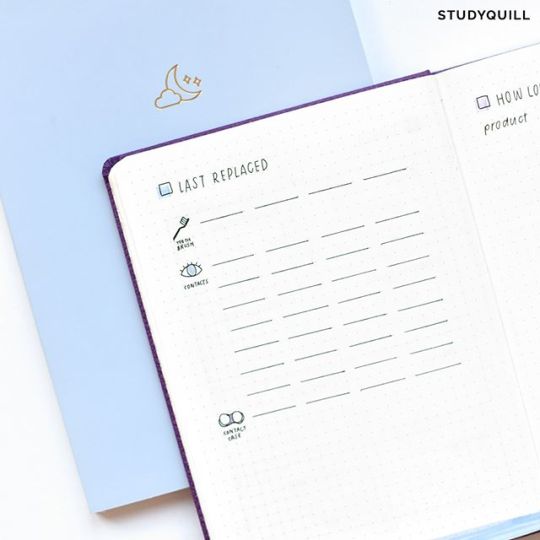
the blue notebook in the background is from @shoplavendaire! i’m going to start using this notebook as my “messy journal” this year. would you guys like to see a video about that? ⠀⠀⠀⠀⠀⠀⠀ posted on Instagram - https://ift.tt/2s0iPeC
228 notes
·
View notes
Photo

These are ways that help me boost my productivity. You might’ve heard about many of them but I thought that seeing them all in one place could help!
1K notes
·
View notes
Text
Not to be a fucking nerd or anything but writing academic papers is actually super fun when you have a genuine interest in the topic!
73K notes
·
View notes
Photo
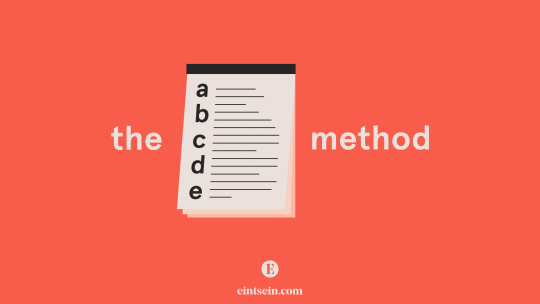


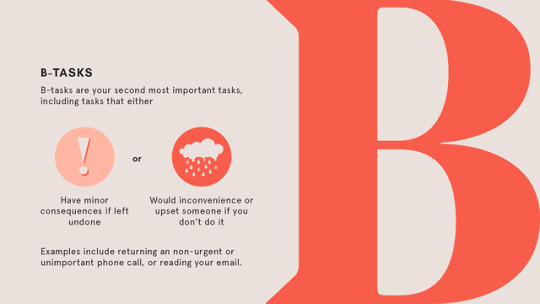

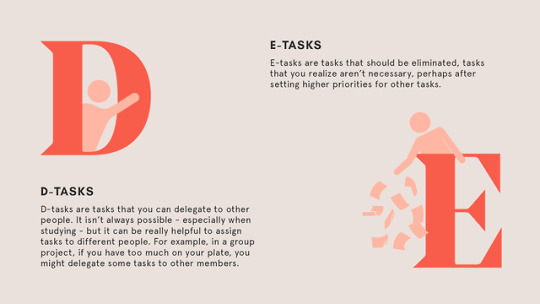

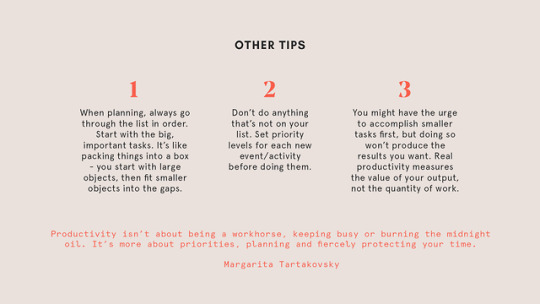

The ABCDE Method: Accomplish Tasks more Efficiently
I recently came across the ABCDE method that’s similar to what I do to stay productive each day: instead of lumping up all your tasks, sort them into categories and tackle each of them differently. Here’s an outline of the method. Hope it helps :)
16K notes
·
View notes
Text


Learn how much sleep you really need. There are general guides based on your age group. However, every person is different, so it’s the best to access your sleep needs on your own. 2 ways to do that:
Keep sleep diary. Track your: bed time | wake up time | total hours of sleep | feelings after waking up (exhausted, refreshed, etc) | energy levels throughout the day Alternatively, print one of these a bit more extensive diaries from: NHS | National Sleep Foundation Harvard Medical School | Anxiety Canada After tracking for 1-2 weeks try looking for patterns and determine what works the best for you.
Take a sleep vacation. This might be a little easier than the diary. Basically, for a week or two go to bed at the same time without setting an alarm, allowing your body to wake up naturally.. After a while, you will notice that you’re getting the same amount of sleep.
Decide on your permanent & consistent sleeping times. I.e., when you need to go to bed and wake up in order to get enough sleep.
If you struggle with oversleeping, everyday try to wake up 5-10 min. earlier than the day before. Until you wake up at the time you need.
If you struggle with waking up & snooze button is your bff:
Put your alarm clock as far away from the bed as possible.
Use alarm apps that make you take a photo, solve maths problems, receive a call from a stranger: Alarmy | Wakie | I Can’t Wake Up | More…
Drink a glass of water right after you wake up.
Pour another glass of water on yourself. ¯\_(ツ)_/¯ (u do what u gotta do)
Prepare cold brew coffee, leave it by your bedside, drink it right after you hit your alarm. Alternatively, buy some caffeine pills and take one right after wyaking up with a big glass of water.
Have your blinds/curtains open the night before, so that it’s bright after you wake up.
ALTERNATIVE FOR EVERYTHING IF YOU’RE RICH AF: buy one of those wearable fancy health monitors, connect it to some fancy app and SAD lamp that will wake up up feeling refreshed and alive.
If you struggle with going to sleep on time:
Limit your caffeine intake to 6 hours before your bedtime.
Try to limit your screen time at least 1h before bed.
Install blue light filters on your phone/laptop.
Do something relaxing (read, meditate, journal, drink tea, etc)
Try not to eat a lot before going to bed.
Try bed sheet sprays, like lavender.
Basically, establish a nighttime routine with all of these (skin care, reading, change into pajamas, etc), pavlov condition your brain to get sleepy when you do all of those things.
If you still can’t fall asleep, and been lying in bed for hours, get up and do something relaxing, like reading or listening to music. Lying in bed awake can create an unhealthy link between your sleeping environment and wakefulness. Instead, you want your bed to generate sleepy thoughts and feelings only.
Try to keep your sleeping schedule consistent. It is really important to go to bed and wake up at the same time every day. Even if it’s weekend. Or even if that means getting less than 7hrs of sleep that day. I’d say waking up at the same time everyday is the most important step, which will help you the most with fixing your sleeping schedule.

IF YOU HAVE BEEN STRUGGLING WITH LONG TERM HEALTH CONDITIONS, OR ARE SEVERELY UNDERWEIGHT/OBESE, PLEASE IGNORE THIS STEP AND RATHER SEEK HELP FROM A DIETITIAN AND/OR YOUR FAMILY DOCTOR.
This step really depends from person to person, but firstly I suggest you take some blood tests to see if you have any deficiencies, etc. Especially, if you struggle with cravings.
Try intermittent fasting, if you struggle with binge eating or overeating. As it will help you to learn to listen to your body better: when it’s hungry, when it’s full, etc. It’s really simple, there are many methods of intermittent fasting, but I’d suggest 16/8 for the beginners. (You can find a short guide here or google for more information)
DRINK ALL THE WATER. Again, if you’re not drinking enough water, try to level up your water game incrementally. Download some water tracking app on your phone to help you. Drinking water will make you more energetic, increase your metabolism, and decrease you appetite (among many other benefits). If you really struggle with meeting your water intake:
Reward yourself when you meet your daily/weekly goals.
Drink through the straw - idk why, but you are going to drink much more if you use a straw. Trust me.
Get a nice water bottle.
Flavour your water with fruits etc.
Check this video for more tips
Track what you eating. I would really suggest tracking your meals for around a month. Because, most of the time people have no idea that what they’re eating is unhealthy. Again, download an app for that.
Make your own meals once in a while. Not only this will save you money, but it’ll help you to see what’s really going into your body. Start by doing that once/week and build it up depending how much time you have.
Eat more veggies/fruits. Go to your local market and buy some veggies/fruits, you have never tried before. I’m sure you’ll find your new favs. LEARN HOW TO COOK THEM. Experiment: boil, stir fry, ~roast~…
Eat/buy less meat. Not only it’s good for the environment, but it is good for you, too. Get a veggie burger instead of the beef one, increase the portions of your veggie sides, try meatless Mondays, etc. (Here’s some more tips)
Cut dairy. Find your new favourite milk substitute. Advice: Oat milk is amazing with the tea and oatmeal/porridge; hazelnut milk is amazing on it’s own; cashew milk goes well with cereals.
Learn more about nutrition in general. DO YOUR OWN RESEARCH! It will help you to make better food choices and it will make eating healthy much easier in general, because once you understand all the chemistry behind the food and what it does to your body, you kinda don’t want to make yourself feel terrible. Here are some free resources: – Human nutrition course from Alison.com – Crash course Metabolism&Nutrition: Part 1 and Part 2 – The Health Nerd’s YouTube Playlist about nutrition – What I’ve Learnt YouTube Playlist – Free Nutrition courses on edX

Define your goals. Do you want to lose weight, do you want to get stronger, gain weight, be able to climb the stairs without losing your breath, run 5k, punch a god in the face?
Remember - you’re already half-way there. Being physically fit has a lot to do with what you put into your body. So, if you fulfilled the previous step of eating healthy - you are done ½ of the work!
Make a plan. A Reasonable plan. Be honest with yourself. Alternatively, there are many already-made plans if you’re feeling lazy. Like, Couch to 5k for running, Beginners 30-day exercise guide, 30 days of yoga, etc.
Start small. Like, 5 min exercise in the morning. Or doing 10 sit ups per day. Don’t do anything overwhelming, like running 5k everyday if you haven’t run for the past 5 years.
Make sure that you kinda like what you’re doing. If you absolutely hate running - don’t do it. Hate doing sit ups in the morning? Try yoga instead.
Explore, until you find what you like. You don’t have to go to gym to get fit, especially if you hate it. Find a type of exercise that you actually like. Maybe it’s dancing or hiking, taking your dog for a walk. Sign up for several trial lessons at various sport clubs. Ditch ‘em, if you have to, until you find something that you love. Stick with that.
Do the small changes in your everyday life. Stairs>Escalator, Walk>Drive, Do some squats while brushing your teeth, switch from regular desk to standing desk, etc… Find ways to incorporate being active into your everyday life as, unfortunately, evolution hasn’t caught up with out sedentary lives yet.
Track your effort instead of your progress. You cannot really control your progress that much (especially if your goal is to lose weight). However, you can always control your effort. So measure it instead. This will leave you more motivated as you will be able to see that you can do more and more everyday. Whereas, if you tracked your progress, you may not always get the result you hoped for, which might demotivate you and make you upset, wanting to quit.

Do the previous 3 steps and you’re 10 miles ahead as mental health depends A LOT on the physical health.
See a therapist/doctor. Depression is an illness requiring medical treatment. So, get it. Remember: there is absolutely no shame in having a mental illness as there would be no shame if you had a flu, broken leg, headache…
Learn about it. Knowledge is power. Learning to notice unhealthy thinking patterns and dissociate yourself from them can help a lot. Here are some resources on depression: – Short TED-Ed video “What is depression?” – Long TED talk about depression – MIND Understanding Depression Booklet – “What causes depression?” by Harvard Medical School – “Understanding Depression in Young People” online course – “Understanding Depression and Anxiety” Open University course
Get extra support. Talk to your friends or family. Or maybe someone on the internet (7 Cups free chat services: website | android | iOS ).
Write it down. If you don’t want to talk - write down your thoughts. It can be just as helpful. It’ll help you to understand yourself better, notice errors in your thinking, etc. Buy a cheap notebook (or expensive one, up to you) and start a journal. Try being consistent by writing every morning or evening or both, but DO NOT BLAME YOURSELF if you miss some days. Read through your past entries. Analyse them. Extract the lessons.
Distract yourself from yourself. Get something to take care of, so that for a moment you would be able stop thinking about yourself. Get a plant, or a dog, or a fish. Focus on keeping them alive and well. Alternatively, try volunteering.
Self-care day. Dedicate at least one day per week for self-care. Take yourself out to a museum or some fancy cafe, do some stuff you like, whatever your hobbies are, do some physical self care: bath, face mask, manicure, etc., listen to some nice music, watch a film…
Try self-help options. Sadly, therapy is not always available and your friends/family doesn’t always know what to do or say. Luckily there are TONS of resources online: – NHS Low Mood and Depression: A Self-Help Guide – Pacifica (website | android | iOS ): offers psychologist-designed tools to address stress, anxiety, and depression based on CBT, mindfulness meditation, mood/health tracking. – Moodpath (website | android | iOS): interactive two-week depression, burnout, and stress test that tracks your emotional and physical well-being – MIND self-care guide for depression

Manage your emotions. The biggest cause of procrastination is an inability to navigate negative emotions associated with doing a thing. You need to learn to recognize your negative feelings and realize that procrastination is primarily about “feeling good now”. Studies have shown that mindfulness can help you with that. –Getting started with Mindfulness Guide.
Figure your reasons why. Procrastinators often suffer from lack of identity, don’t know what they want to achieve, or why they want to achieve it. It’s hard to work towards a goal, when you don’t have one. Also, people who are ‘social perfectionists’ and are motivated to work because of other people’s/society’s expectations rather than their own sense of accomplishment are more likely to procrastinate.
Divide your tasks into concrete smaller goals. Sometimes things seem to be hard because they are very vague. e.g. “working on my thesis” or “studying for my class” often means doing nothing, whereas “reading 4 pages of a textbook to understand a concept I need to summarize in my thesis” is a concrete, broken down goal.
Celebrate your victories instead of mourning over your loses. So the only thing you’ve done today was write one sentence for your 20 page essay? Amazing! Buy yourself some candy for that!! I mean, you could’ve done nothing, but you didn’t - you wrote that one sentence and that’s worth celebrating.
Redefine the success - doing something is a hundred million times better than doing nothing. Also, if something is worth doing, it is worth doing poorly.
Do it for only 2 minutes. If there’s an important thing you’ve been putting off for a while, tell yourself that you will only spend 2 minutes on doing it. If after 2 minutes you don’t want to do it anymore, great, stop it. However, after 2min. you actually might want to do more. No pressure either way.
Track your productivity. Track how much time you’ve been productive that day. Try to increase that time by a little bit every day.
Always forgive yourself. So, it’s been a week and you’ve done nothing? Don’t sweat it. Let it go. Blaming yourself will bring you absolutely nothing. Nothing good will come out of your negativity on yourself. So stop it. Forgive yourself and start again. And again, if you need to. Never stop trying. Always pick yourself after you fall. Beating procrastination and increasing your discipline is a skill. And all skills can be build on. There is nothing in you stopping you from changing. Remember that. More resources here: – “9 Reasons You Procrastinate (and 9 Ways to Stop)” PsychologyToday – Solving Procrastination Website – “Helping Students Who Procrastinate” lecture by Tim Pychyl

Go to google.com.
Type in: “How to do taxes *the name of the country you’re living in*”
Read the results.
Alternatively, if you like socialising, ask some adults, whom you know, about it. Trust me, older people love teaching the youth. Learn all the lessons you can from them.

Remember that just as with beating procrastination, making phone calls is a skill. And, again, skills can be learnt.
Get a new SIM card. Top it up.
Call some local business (cafe, restaurant, shop, vet, etc). Ask some random questions, write them down if you fear of forgetting them. Some examples: – What time do you open tomorrow? – Are you open this Sunday? – Do you cater for people with dairy allergy? – My cat hasn’t eaten for a day, what should I do? – Alternatively, you can pretend that you dialed a wrong person and talk about whatever, e.g. “Hey!! You wont believe what I saw today!! *start telling a made-up story*…”
If you’re really struggling, write down and follow this format, rehearse it if you need: You: Hi, is this *the name of the institution”? Them: Yes, how can I help you. You: I was wondering *insert a question from a list* Them: *answer the question* You: Thank you, what about *insert another question* Them: *doesn’t know the answer* You: That’s okay. I will look it up myself / I will call you back later. Thank you for your help. Have a nice day!
If you get uncomfortable or mess up - just drop the call. Use fake names. No consequences whatsoever. Or say “Sorry, wrong number”, “Sorry, I gotta go”, “ I apologise, I need to hang up, I’ll call you back.”
Repeat until you build up your game and your phone-call anxiety starts to diminish.

Here you are in your peak mental & physical health. Go prove all those haters wrong. Follow your dreams. Do what you wanna do. And when new issues arise, remember that there are tons of resources out there to help you out. What matters, is that you actually implement those resources. Information is out there, but you still gotta do the work. And you can do the work. Remember all the times you already did it. You learnt to walk, to talk, to read, to count, to ride a bike… algebra, second language?, using a computer, driving… etc… You overcame so many obstacles so far. You learned from them. You can do it. It’s over for everyone and everything that wants you to thing otherwise.
(before reblogging, check for the updated version of this post here)
2K notes
·
View notes
Text
The Mandatory Midday Break: Why You Should Take One and How

It’s Monday afternoon. I have two papers and a programming assignment due Wednesday, and an exam on Friday, not to mention two homework assignments I haven’t started on. But I’m sitting in a cafe with my earbuds in, listening to The Moth Radio podcast while I drink my cup of Cafe Au Lait and occasionally bite into my vanilla macaron. I’ve been sitting here for nearly 45 minutes and I don’t plan to start working again until another 15 minutes.
What am I doing? Shouldn’t I be working right now? Why am I wasting my time? Well, I’m taking one of my mandatory midday coffee breaks.
Why take a midday break?
You probably think you’re too busy to take breaks. You think there are way too many things on your to-do list that you can’t afford to lose even five minutes of time away from doing them.
This is how I used to see things, too. Even though I’ve been using the pomodoro method for a relatively long time, I discovered that I needed something more, especially since my daily college schedule very much tempts me into studying for long stretches of time. I used to think that whenever I didn’t have class, I had to study, but that was just harmful to my overall productivity.
These mandatory coffee breaks serve as a sort of mental reset, a time to wind down just a little bit so I can get back up refreshed and ready to tackle on more tasks. They help me stay sane and not feel stressed and overwhelmed by all the things I have to do, and they also help me restore focus so that I can achieve full concentration on my tasks after the break.
Sometimes we don’t realize how draining all the chaos of studying and working can be until we stop doing those things, so taking these breaks can definitely help you recenter yourself.
I’m sure you can see how these breaks are helpful, but how exactly do I take these breaks?
When?
I take my coffee breaks during the time of day when I would feel sluggish and slow, from 3:30 to 4:30 pm. This is of course different for everyone, but regardless of the exact time, if I chose instead to work during my slow hours, I wouldn’t get much done, and I’ll only end up feeling too tired to do much else the rest of the day.
Where?
As much as I can, I’d go someplace where I don’t normally study so I can get the entire ‘busy mindset’ out of my system. This place could be a cafe on campus, or even one of the quads or something.
One of my favorite ‘break spots’ is the art museum on campus. I could walk around the museum during my break, maybe even go to the fifth floor where there’s an amazing view of Ithaca, and then I’d have a cup of coffee in the lobby (you can make one for $1), and then continue studying or doing schoolwork in the lobby.
Another great place for a break is anywhere with outdoor seating. This also allows you to take a breath of fresh air and re-energize your brain to take in more information after your break. However, as the weather’s getting chilly here in Ithaca, outside’s not the best place to be when it’s not a very nice day out.
If you’re in high school, I realize you might not have the freedom to go wherever you wanted to; I wasn’t even allowed to leave school grounds during the day. You could simply go outside or again, go somewhere you don’t usually study - this would be the best option if you’re at home by the time you want to have your midday break. (I would go out to my terrace or sit in my living room.)
What to do?
During these breaks, I’d usually write in my journal, read a book, listen to music or podcast, or sometimes make music on my phone (with airplane mode turned on so I don’t get distracted by any notifications). Sometimes, if any of my friends are free, I’ll ask them to come along and we’ll chat (in practice, this is actually very difficult because my friends and I have vastly different schedules, so yeah).
If I’m feeling especially tired, I’ll go back to my dorm to take a nap. However, with the weather getting colder and the sky growing darker, it’s very very tempting to extend my power nap, so I just settle for a cup of coffee.
What if I don’t?
Sometimes you might feel guilty for taking such a long break, and I admit I sometimes still feel that way, but you have to remind yourself that taking this break will have a greater net positive effect than if you continue working.
I’ve noticed that on days that I don’t take a break - or even shorten my break - I perform less effectively on my tasks and I’m less productive. This could actually lead to sleeping later (which it had a couple times) and as you all know, lack of sleep reduces cognitive functioning.
I’ve definitely experienced physical consequences of not taking breaks: one time I was working on an assignment for my computer science course, but since I was a little behind, I didn’t take the midday break in fear that I wouldn’t finish it on time. However, by the time I finished, my head was so hazy and my vision was blurry and I couldn’t really do much else afterwards. The worst thing was, I also had a philosophy paper due that night which I’ve finished but still needed to revise one last time. I knew this was bad, so I took a 45 minute break afterwards, before I revised and submitted my paper.
I know it can be difficult to stray from your tasks once you’ve achieved a certain momentum, but trust me, you need to take that break. Like, ok, I managed to study for my philosophy midterm in 4-5 hours, but it could’ve easily taken me 10 if I hadn’t taken a midday break that one Tuesday afternoon.
Take a while every day to detach yourself from school or work. Don’t try to excuse yourself from having a break. Make time for a break. By mentally resetting your brain, you’ll achieve greater productivity for the rest of the day, and be able to tackle your remaining tasks more efficiently.
So yeah, mandatory midday breaks are one of the strategies I’ve been using to maintain wellness in my college life, and I hope you’ll consider making it a part of yours, too!
As always, if you have any questions or comments, feel free to drop me an ask :)
6K notes
·
View notes
Photo



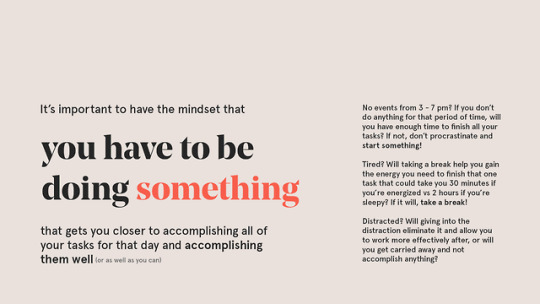

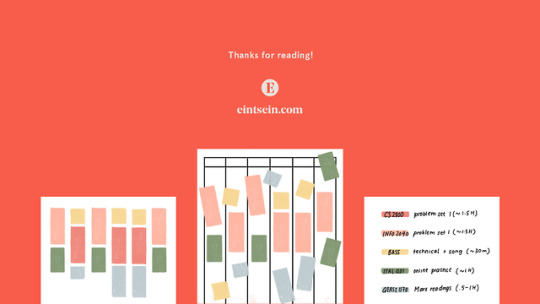
Flexible Time Blocking: A More Breathable Way to Get Things Done
I’ve met a lot of people who struggle with sticking to a schedule - myself included - so here’s one way you can get things done without restricting your spontaneity.
Linked: The ABCDE Method: Accomplish Tasks More Efficiently
Hope this helps!
12K notes
·
View notes
Text
gentle reminders in case you need it:
it’s ok to start “late”
drink water if you haven’t for hours
it’s ok if u need more time than other people
it’s ok to feel what you’re feeling
you have a cute smile
you make people happy
you have plenty of good traits
you are loved
you deserve all the good things
it’s ok if you relapse, it doesn’t make u weak
bad days are just temporary
tomorrow is a new day
you can heal again
I’m proud of you
81K notes
·
View notes









